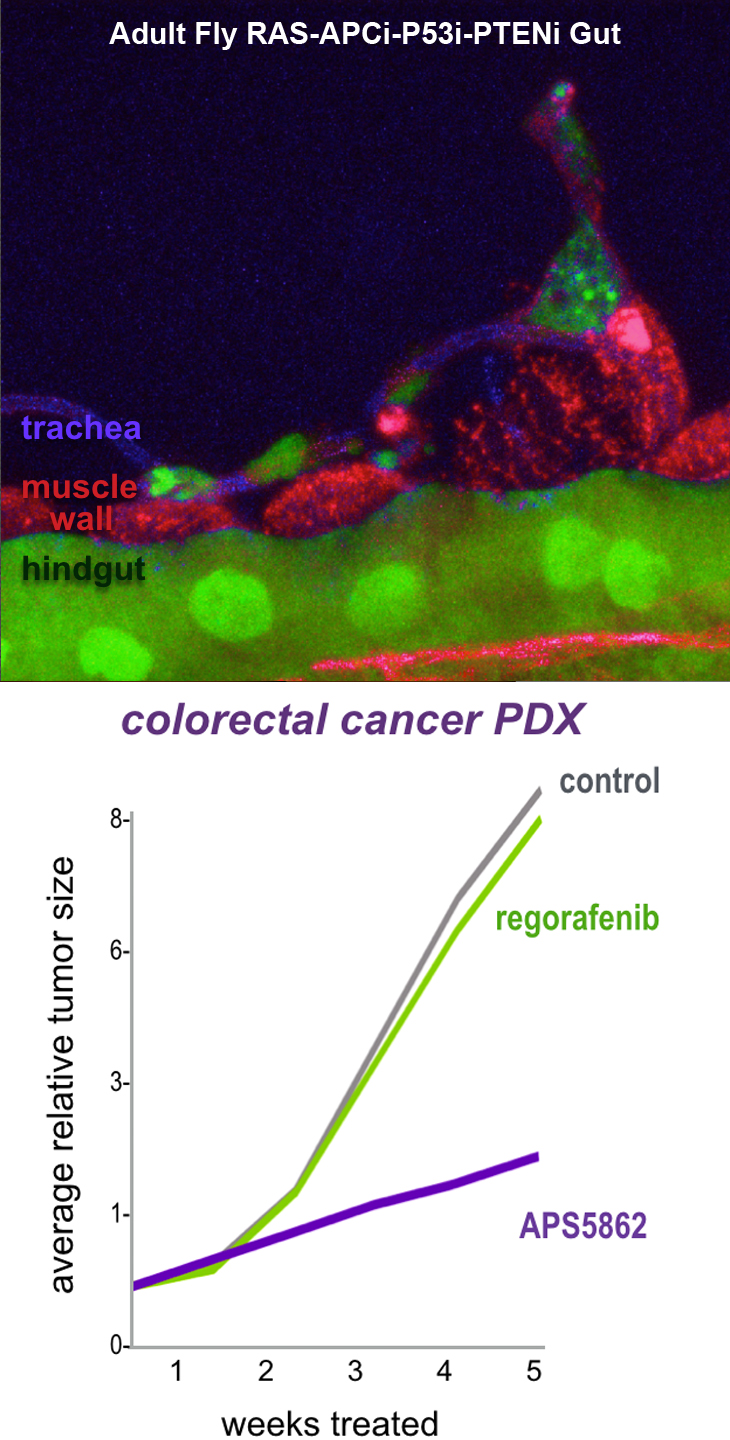Colorectal Cancer
Challenge
Colorectal cancer (CRC) remains the second leading cause of cancer mortality in the United States. Despite an increasing number of therapeutic options for CRC patients, those diagnosed with metastatic disease (mCRC) have a five year survival rate of 11%. Further, toxicities from targeted therapies are substantial: for example, most approved therapies inhibit FLT1, which is closely associated with kidney toxicity and hypertension. Our team is using our emerging model organism-based platform to develop therapies designed to optimize whole body therapeutic index.
Drosophila Colorectal Cancer Model
We are currently building dozens of patient-specific Drosophila models. Each fly transgenic line represents a different patient, with each line having typically 7-10 altered genes. Our goal is to explore the effects of genetic complexity on drug response, with an emphasis on RAS-mutant disease.
To date, we have screened ~60 compounds/drugs/drug combinations for their ability to improve survival of RAS(G12V)-P53(RNAi)-APC(RNAi) flies. Seven drugs and two drug combinations showed significant ability to rescue. In addition to known drugs, we identified multiple novel compounds developed with our fly/chemistry approach. Next step: testing these hits on our more complex models.
Mouse Xenograft Models Respond to Fly-Derived Hits
One of the most interesting Drosophila hits was examined in Patient-Derived Mouse Xenograft (PDX models to examine tumor progression. The ability of APS5-86-2 to rescue tumor progression was striking, especially when benchmarked against standard-of-care regorafenib (Image). This suggests that Drosophila CRC models can be predictive for mammalian efficacy.

Relevant References
A Whole Animal Platform to Advance A Clinical Kinase Inhibitor Into New Disease Space. Masahiro Sonoshita, Alex P. Scopton, Peter M-U. Ung, Matthew A. Murray, Lisa Silber, Andres Y. Maldonado, Alexander Real, Avner Schlessinger, Ross L. Cagan, and Arvin C. Dar. Nat Chem Biol. 2018 Mar; 14(3): 291–298. PMID: 29355849
Restraining Network Response to Targeted Cancer Therapies Improves Efficacy and Reduces Cellular Resistance. Das TK, Esernio J, Cagan RL. Cancer Res. 2018 Aug 1;78(15):4344-4359. doi: 10.1158/0008-5472.CAN-17-2001. Epub 2018 May 29. PMID: 29844121
KIF5B-RET Oncoprotein Signals through a Multi-kinase Signaling Hub.
Das TK, Cagan RL. Cell Rep. 2017 Sep 5;20(10):2368-2383. doi: 10.1016/j.celrep.2017.08.037. PMID: 28877471
Drosophila Cancer Models Identify Functional Differences between Ret Fusions. Sarah Levinson, Ross L.Cagan. Cell Reports 16, Issue 11, 3052-3061. https://doi.org/10.1016/j.celrep.2016.08.019
Functional exploration of colorectal cancer genomes using Drosophila. Erdem Bangi, Claudio Murgia, Alexander G.S. Teague, Owen J. Sansom & Ross L. Cagan. 2016 Nature Communications DOI: 10.1038/ncomms13615
Breast Imaging in the Era of Big Data: Structured Reporting and Data Mining
Laurie R. Margolies, Gaurav Pandey, Eliot R. Horowitz and David S. Mendelson. American Journal of Roentgenology. 2016;206: 259-264. 10.2214/AJR.15.15396
